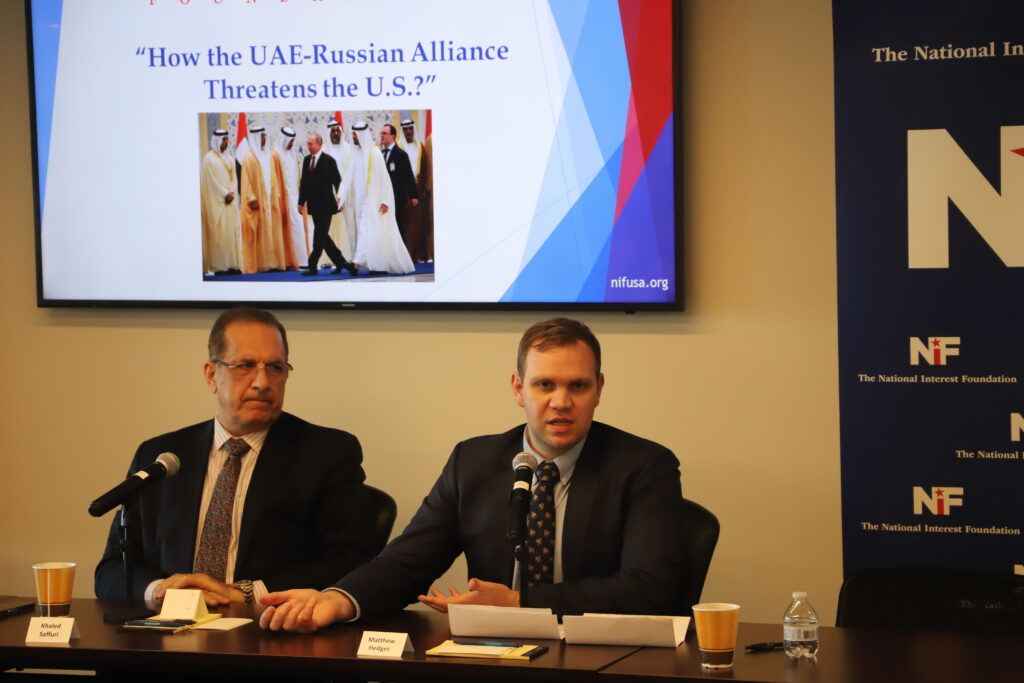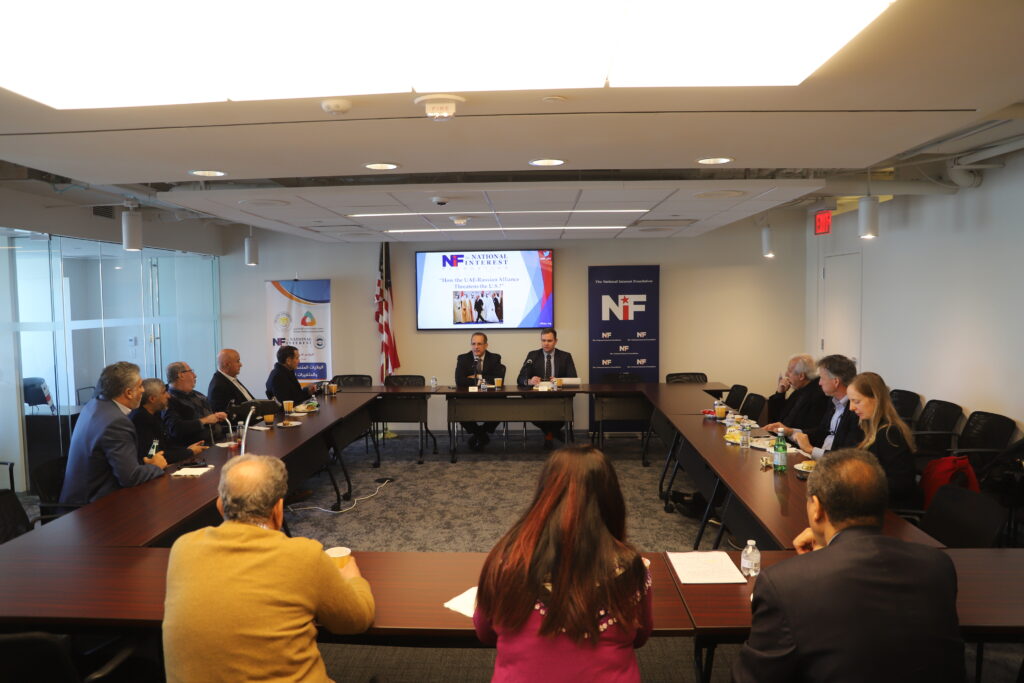Recently, on Monday, November 14th, the National Interest Foundation had the honor of hosting Dr. Matthew Hedges for a private lunch event. The topic of discussion was how the UAE-Russian alliance presents a threat to the United States. During the event, Dr. Hedges covered the different areas of policy that this alliance affected and how the alliance will likely proceed in the future. He also covered his time in UAE custody and the torture he was subjected to at the hands of Emirati authorities.
Dr. Hedges began by explaining the UAE-Russian alliance in the context of the Ukraine war, the UAE’s decision to abstain from condemnation against Russia, and its later U-turn demonstrating how difficult an issue this is for Abu Dhabi. The UAE has since aligned with the West at the international level, but has maintained overt public engagement with Putin; both UAE President Mohammed bin Zayed and Abdullah bin Zayed have visited Moscow throughout the war. The UAE has tried to maneuver this to maintain a position of mediation, but the UAE is not seen as a trusted partner for Ukraine while the West continues to trust their intentions.
He continued by explaining how during the last decade, the West has retreated from the MENA region and Africa allowing Russia to expand its influence. Key to this is the UAE’s central position as part of a North-South channel. Several prominent channels have emerged which should not just shock the West, but demonstrate the need for an honest reappraisal of relations with the UAE. As has been seen recently, it is now clear that the UAE has passed a threshold whereby they have gone beyond exploring their own interests and are now working actively against Western interests. While the Russian-Emirati relationship is strong and growing, it also helps to strengthen China’s international role.
Firstly, security cooperation between the UAE and Russia has been widely seen across Africa. Cooperation has been seen in Sudan, Libya, Mali, and Egypt. Russian mercenaries Wagner have worked alongside Emirati allies General Haftar and Mohammed Dagalo “Hemeti.” This has helped to sustain and support mutual objectives that are inherently anti-democratic and overtly abuse human rights norms and values. Taken further following the Arab Spring, the UAE paid Russia for over $2bn in arms for Egypt. State cooperation has further seen the UAE work closely with Russian air defense, co-research the development of a 5th generation fighter jet, and explore unmanned systems, cyber, and missile technology. Lacking Western interest, this partnership is heavily weakening our interests.
Looking forward, however, Russia will likely be able to secure a foothold in Africa either at Alexandria, Port Sudan, Somalia, or even Yemen. By doing so, the UAE will become a central hub for Russian and Chinese activity in Africa threatening the Western position. This will enable Russian operations to work openly and build coalitions from Mauritania through to Somalia, helping them to increase influence and support a growing nexus of economic activity.
In this context, the Russian-Emirati partnership has already proved a success for Moscow. Sanctions on Russia due to the Ukrainian war have only prompted an estimated 4% drop in economic output. This is largely due to the ability of states ineffectively applying sanctions and enabling Moscow to continue exporting goods. Looking broadly, the UAE plays a crucial role for Russia, and China, in establishing pivotal logistic points upon which to build upon. This focuses largely on port infrastructure and political stability while China seeks to connect states together through physical connections. Russia then provides security oversight for regimes and their continued control of industrial production. China has announced its vision for a ‘Green Wall’ which will span the Sahel in North Africa and optimally aligns with the Russian and Emirati presence within the region.
The thing that worried Dr. Hedges the most is the fact that this is happening so overtly and without condemnation. The Russian proxy Wagner is present across the region enabling gold, diamond, uranium, and oil to be extracted and exported. The UAE is again a crucial link in this with its gold refineries and port network providing a competency that can be exploited beyond international sanctions regimes. The Emirati-Russian connection has been used by multiple Russian firms to circumvent sanctions with Novatec, Sovcomflot, and Nordgold, all establishing physical premises within the UAE. Not only are these firms and others directly connected to sanctioned individuals, but they are thriving because of the war. This year alone has seen Russian oil to India increase by an estimated 25% percent signaling the value the UAE has for Russian business. A similar model is being practiced in Central Asia with the UAE providing support and legitimacy for enhanced economic cooperation. China’s ‘One Belt, One Road’ is being utilized and exploited by the UAE for a perceived post-Western future.
This forward vision has wide-reaching implications that demonstrate the desire to lead a post-Western future. This is led by a reinterpretation of laws and values that restrict freedom and empower autocratic leaders. The UAE can do this through actors such as Major General Ahmed Naser al Raisi, the current President of Interpol. Dr. Hedges has a civil and criminal case against him, and other figures for their involvement in his torture. This is not, however, a personal vendetta as his tenure has already presided over increased abuses of international laws that contradict EU and International Law. Activists from the Middle East and Chinese Uyghur Muslims have been tracked down and renditioned, with the legitimacy provided by Interpol.


